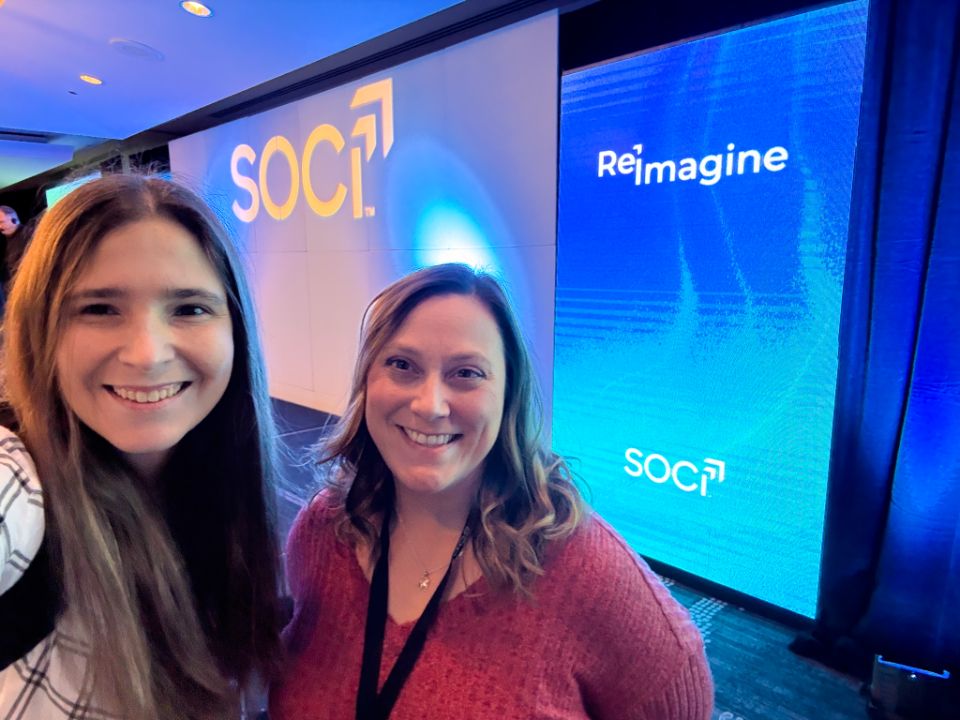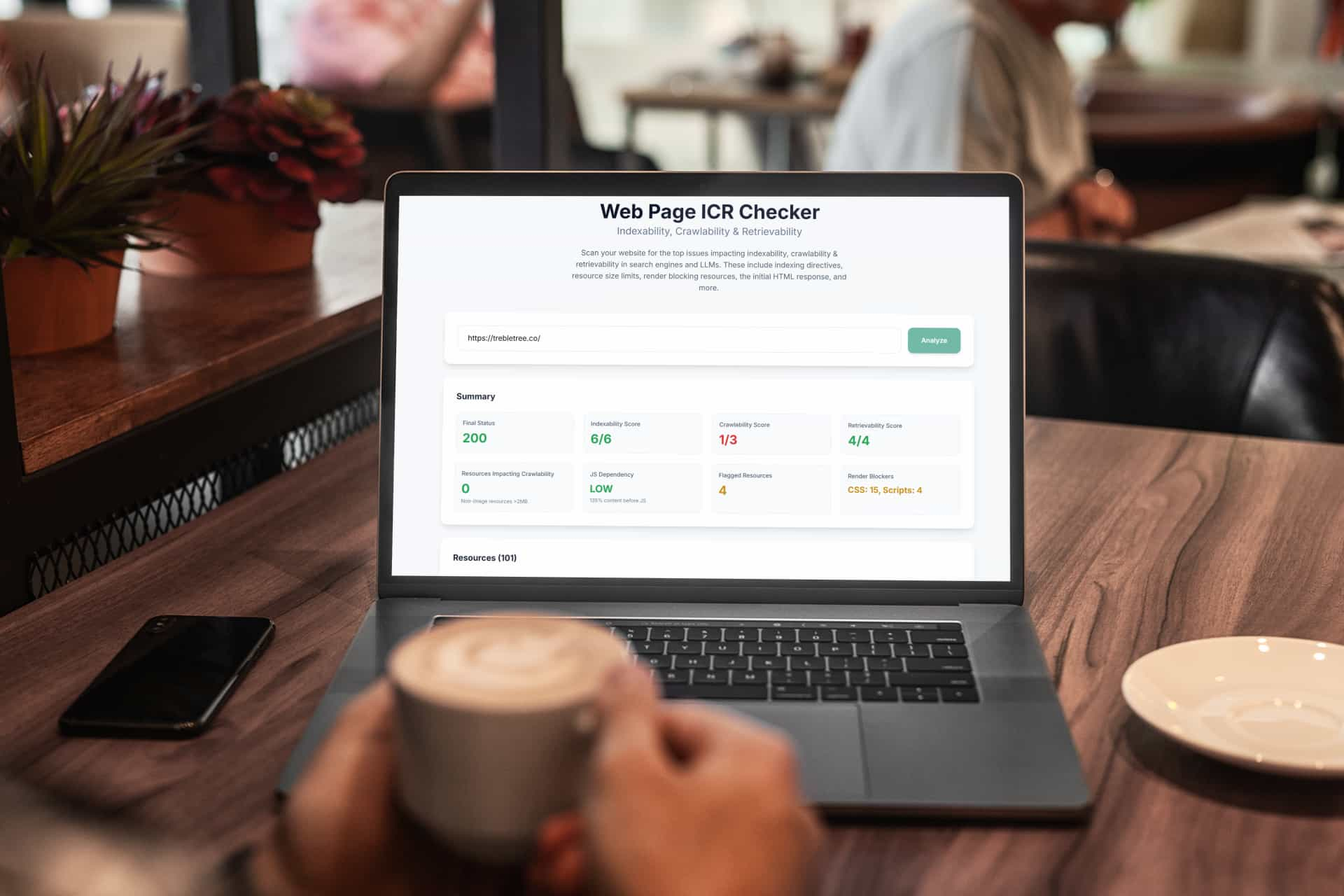Game-Changing Insights from the 2025 SOCi Reimagine Conference
We came for the insights and stayed for the tiramisu lattes. (Also: pumpkin spice and nitro cold brew. The Starbucks Roastery in Chicago did not disappoint.) But between the caffeine and the keynotes, one thing was clear: search is changing—and fast.
But let’s not panic. This isn’t the end of SEO. It’s the start of something new. In fact the future of search is extremely exciting. AI, digital agents, and local optimization are transforming how people find and interact with businesses. If you’re a local or multi-location brand, this shift isn’t just interesting—it’s essential.
Here’s what stood out and how Trebletree is helping clients stay ahead of the curve.
Search Isn’t Dead. It’s Just Growing Up.

Search used to be simple: type a few keywords, scroll through results, click a link. But now? The way people search is smarter, more visual, and increasingly hands-off.
- AI agents are becoming the new searchers. Think of them as digital assistants that can take action on your behalf. Google’s Project Astra and OpenAI’s ChatGPT aren’t just answering questions—they’re booking appointments, finding products, and even calling local businesses to check availability.
- Search is becoming embedded in everyday objects. One of the many memorable moments came from Gary Vaynerchuk (AKA Gary Vee), who painted a picture of a future where your shampoo bottle knows when it’s running low and reorders itself—no typing, no clicking, no thinking required. That’s the Internet of Things (IoT) in action: everyday items connected to the internet, quietly gathering data and making decisions on your behalf. In this world, search doesn’t start with a question—it starts with a signal. For marketers, that means thinking beyond keywords and considering how your brand shows up in the ecosystems where these smart devices live.
- Visual search is booming. Google Lens now processes 25 billion searches a month, and 1 in 5 of those have commercial intent. That means people are pointing their phones at things and expecting to buy them. Younger users are already starting 10% of their searches this way.
- Search is becoming more conversational. Instead of typing “best pizza near me,” people are asking AI to “find a table for three at a good pizza place in Austin at 7pm.” And the AI delivers.
Quick explainer:
AI agents are like supercharged digital assistants that can understand your preferences and take action for you.
Visual search lets users search using images instead of words.
Conversational search means people are using natural language—like they’re talking to a friend, not a search engine.
Takeaway: SEO isn’t going away—it’s evolving into GEO (Generative Engine Optimization). That means your content still needs to be findable, but now it also needs to be usable by AI. You want to show up in search results and in the answers AI gives.
Agentic Marketing: From Buzzword to Business Strategy
If we had a dollar for every time someone said “agentic” at the SOCi Reimagine Conference, we could’ve bought another round of tiramisu lattes. But the buzzword wasn’t just hype—it’s a signal of where marketing is headed.
So what is agentic marketing, exactly?
At its core, it’s about AI-powered systems that don’t just analyze or suggest—they act. These aren’t your average chatbots. We’re talking about intelligent digital agents that understand your brand and can actually do the work: update your business listings, respond to reviews, publish social content, even run ads. Automatically. At scale.
SOCi is already rolling this out with a full suite of agents—Reputation, Listings, Social, Search, and more. Each one is trained on your brand’s data and then cloned for every location you operate in. So your coffee shop in Portland and your salon in Tampa both get personalized, on-brand marketing without you having to micromanage every post or update.
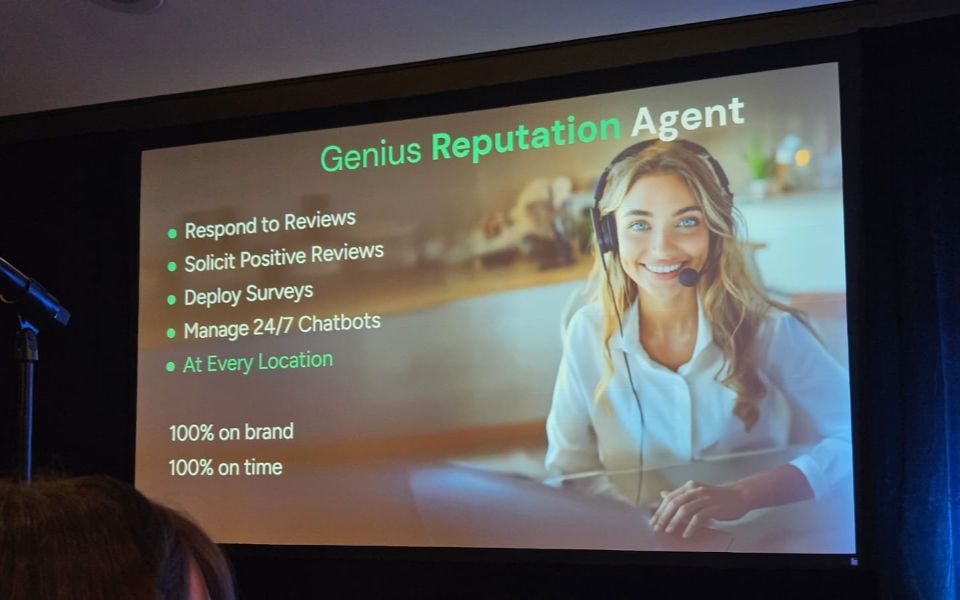
And here’s the really cool part: these agents all share a central “brain”—a large language model (LLM) that’s been trained on your brand’s voice, tone, and data. That means they’re not just smart. They’re consistent.
For multi-location brands, that’s a game-changer. Consistency across locations is notoriously hard to maintain, especially when you’re juggling dozens (or hundreds) of storefronts. Agentic marketing makes it possible to deliver a unified brand experience everywhere, without burning out your team.
What we’re doing at Trebletree:
We’re already exploring how to build these kinds of workflows for our clients. Whether it’s syncing content across locations, automating local SEO tasks, or experimenting with AI-generated content, we’re helping brands tap into the power of agentic marketing—without losing the human touch. Learn more about our Franchise SEO Services.
Google Business Profiles: Your Local AI Anchor
If there’s one tool that’s quietly become a powerhouse in the new search landscape, it’s Google Business Profiles (GBP). Once just a digital phone book listing, GBP is now a central player in how customers—and their AI assistants—find and evaluate local businesses. Don’t just take our word for it. This was a core theme in the presentation from Lisa Landsman, Head of Business Development at Google.
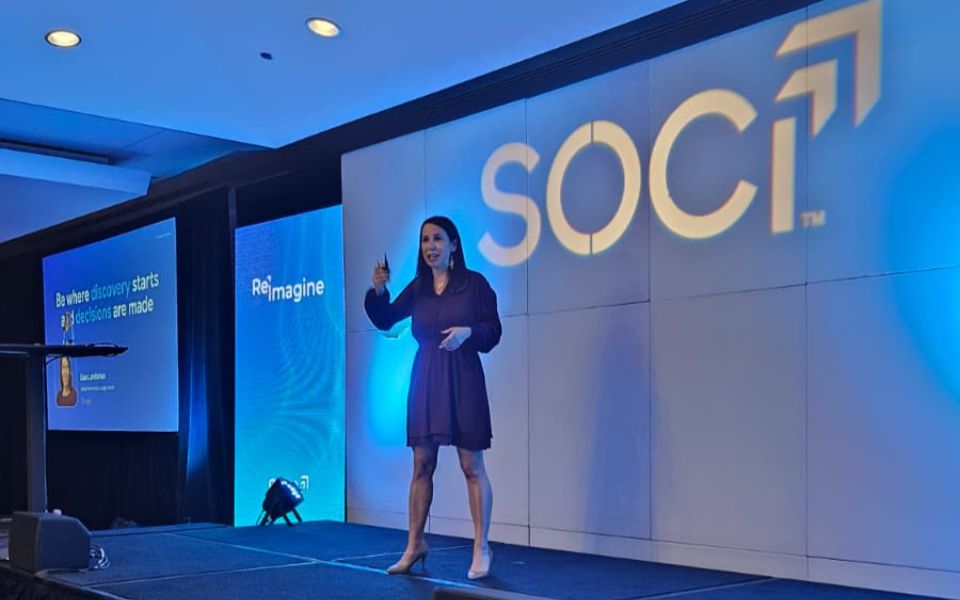
Here’s what’s new and why it matters:
- It’s not just a listing anymore—it’s your storefront. GBP now pulls in everything from your business hours and location to your latest social media posts, events, offers, and even your menu or service list. For restaurants, there’s a new feature that highlights what’s happening at your location right now—front and center in search results.
- AI is helping you tell your story. Google is using generative AI to write business descriptions, and early data shows that customers are 29% more likely to consider a business with a detailed profile. That means the more complete and current your GBP is, the more likely you are to show up—and stand out.
- Social content is coming to Google. Google is starting to pull in posts from platforms like Instagram and TikTok directly into your business profile. That means your organic social content could soon be influencing search visibility in ways it never has before.
- GBP is becoming interactive. Features like WhatsApp chat, short links for reviews, and real-time updates are making it easier for customers to connect with businesses instantly. For service-based businesses, you can even add call-to-action buttons like “Call,” “Message,” or “Book Now” right from your profile.
Quick explainer:
Google Business Profile (GBP) is the panel that shows up when someone searches for your business on Google or Google Maps. It includes your hours, location, reviews, photos, and more. It’s often the first impression a customer gets—and now, it’s also a key source of information for AI tools.
Why this matters:
With AI agents pulling data from sources like Google Maps, Yelp, Facebook, and your website, your GBP is one of the most important places to keep your information accurate, rich, and up to date. If your profile is incomplete or inconsistent, you risk being invisible—not just to people, but to the AI systems that are increasingly making decisions for them.
What we’re doing at Trebletree:
We’re helping clients connect their websites directly to platforms like SOCi, so their GBP data stays fresh and consistent across every location. We’re also advising on what to include—from service lists to social content—to make sure our clients are showing up in all the right places, for both humans and machines. GBP is also super important for our Local Business clients.
SEO + AI: Visibility in the New Search Landscape
One of the most important messages we heard—especially from OpenAI’s Kelly Ryan—is that SEO isn’t obsolete. It’s just evolving. And if you’re doing it well, you’re already halfway to being visible in the AI-powered world.
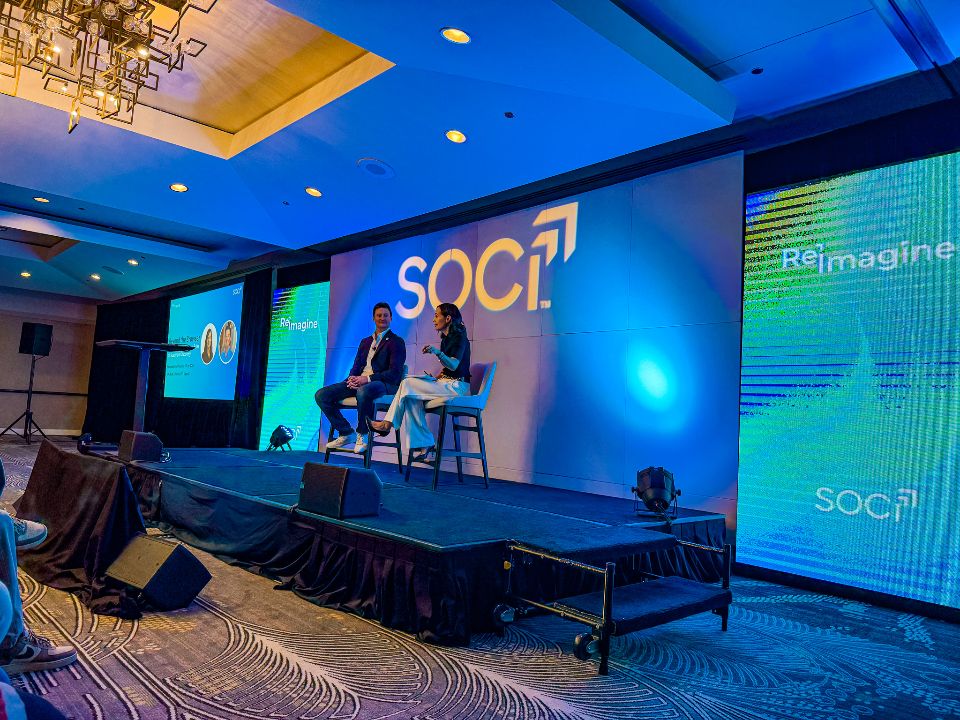
Let’s break it down.
- GEO is the new SEO. GEO stands for Generative Engine Optimization. It’s about making sure your content isn’t just indexed by search engines, but also understood and surfaced by AI tools like ChatGPT, Gemini, and Perplexity. These tools don’t just look for keywords—they look for meaning.
- Rich content wins. Large language models (LLMs) prioritize content that’s detailed, conversational, and helpful. That means product descriptions that actually describe the product, FAQs that answer real questions, and comparison content that helps people make decisions.
- There’s no second page. In traditional search, you might scroll through a few pages of results. In AI-generated answers, you’re either in the top few responses—or you’re invisible. That’s a big shift in how we think about visibility.
- Consistency is critical. AI tools pull data from a wide range of sources—Google Maps, Yelp, Facebook, your website, and more. If your business info isn’t consistent across those platforms, you’re less likely to be cited or recommended.
Quick explainer:
GEO (Generative Engine Optimization) is the practice of optimizing your content so that it shows up in AI-generated answers. It’s not about gaming the algorithm—it’s about being genuinely useful, consistent, and easy for AI to understand.
Why this matters:
AI is already influencing how people make decisions. Whether they’re asking ChatGPT for a restaurant recommendation or using Google’s AI Overviews to compare service providers, your business needs to be part of the answer.
What we’re doing at Trebletree:
We’re helping clients bridge the gap between traditional SEO and AI visibility. That means auditing content for depth and clarity, optimizing product and service descriptions, and making sure data is consistent across every platform that matters.
The Future of LLMs: Context, Content, and Who’s Likely to Win
While the AI space is full of players right now, there’s a growing sense that we’re heading toward a more focused field. Gary Vee made a strong case that Google, Meta, and TikTok are best positioned to lead—not just because of their size, but because of how deeply embedded they are in the platforms people already use every day.
Google’s LLM, Gemini, is a prime example. It’s being trained on data from inside Google’s own ecosystem—Google Business Profiles, YouTube, Maps, and more. That gives it a unique advantage in understanding local businesses and surfacing relevant results. If your brand is active and optimized across these platforms, you’re more likely to be included in the answers AI gives.
But Google isn’t the only one in the race. Meta and TikTok are also poised to play major roles, especially as social content becomes a key signal for AI-driven discovery. These platforms are where people are spending time—and where AI is increasingly looking for context and cues.
The big shift? Relevance across platforms is the new visibility. It’s not enough to show up in one place. You need to be present—and consistent—wherever your customers (and their AI agents) are looking.
What we’re doing at Trebletree:
We’re helping clients diversify their presence across Google, Meta, TikTok, and other key platforms. That means optimizing content, syncing data, and making sure your brand is ready for wherever the next search starts—whether it’s typed, spoken, snapped, or handled by an AI agent.
Where LLMs Get Their Data: What SOCi’s Research Reveals
SOCi shared some eye-opening research based on their extensive work with multi-location businesses—and it gave us a clear picture of where AI models are pulling their local business data from. SOCi data expert, Damian Rollison did all the number crunching so we could better understand how brands can create great content and get noticed no matter where their customers are searching.
Here’s the breakdown:
- 32.5% from Google Maps
- 23.1% from brand websites
- 10.5% from Yelp
- 7.6% from Facebook
- 26.3% from niche sites like TripAdvisor, MapQuest, BBB, and others
That means over 60% of AI visibility is driven by just four sources. If your business info isn’t consistent and optimized across these platforms, you’re likely missing out on AI-driven traffic and recommendations.
SOCi also broke it down by industry:
- Financial Services: 81% of data comes from the top four sources
- Food & Beverage: 88%, with TripAdvisor and Grubhub also playing key roles
- Retail: 89%, including Waze and BBB
- Property Management: 76%, with more diversity (e.g., Apartments.com, Zillow)
The takeaway? Consistency is king. AI tools don’t just “know” things—they pull from real-world data. If your hours are wrong on Yelp or your services are missing from Facebook, that could be the difference between being recommended or being invisible.
What we’re doing at Trebletree:
We help clients audit and synchronize their business data across all the major platforms. That means fewer missed opportunities, better AI visibility, and more customers finding you—whether they’re searching themselves or letting their AI do it for them.

TL;DR: What You Need to Know
If you’re short on time (or just finishing your nitro cold brew), here’s the quick version of what we learned at the 2025 SOCi Reimagine Conference—and what it means for your business:
- Search is evolving, not disappearing. AI agents, visual search, and conversational queries are changing how people find businesses. SEO still matters—now more than ever—but it’s expanding into GEO (Generative Engine Optimization).
- Agentic marketing is here. AI-powered agents can now manage everything from listings to social posts. They’re trained on your brand and deployed across locations, making personalized, scalable marketing a reality.
- Google Business Profiles are critical. GBP is no longer just a listing—it’s your storefront in the AI world. Keeping it updated, rich with content, and connected to your other platforms is essential for visibility.
- AI visibility depends on consistency. LLMs like ChatGPT and Gemini pull data from Google Maps, your website, Yelp, Facebook, and niche directories. If your info isn’t aligned across these sources, you’re likely being overlooked.
- Don’t put all your eggs in one platform. Gary Vee called it: Google, Meta, and TikTok are the ones to watch. Make sure your brand is showing up across all of them.
- SOCi’s research confirms it. Based on data from multi-location businesses, over 60% of AI visibility comes from just four sources. If you’re not optimized there, you’re invisible to AI.
- Trebletree is already on it. From syncing GBP data to building agentic workflows and optimizing for AI visibility, we’re helping brands stay ahead of the curve—and ahead of the competition.
More About Featured Speakers
Gary Vaynerchuk
Serial Entrepreneur, Chairman of VaynerX, CEO of VaynerMedia, and Creator of VeeFriends
Widely known as “GaryVee,” Gary is a leading voice in digital innovation and cultural trends. He’s known for spotting early shifts in consumer behavior and investing in platforms like Facebook, Twitter, and Uber before they became household names. At the conference, he shared his predictions on the future of search, the rise of AI agents, and why platforms like Google, Meta, and TikTok are best positioned to lead.
Lisa Landsman
Head of Business Development, Google
With over 20 years at Google and nearly three decades in digital, Lisa leads initiatives that help businesses grow across Google’s platforms. Her insights into Google Business Profiles and AI-powered discovery were especially relevant for local and multi-location brands.
Afif Khoury
Founder and CEO, SOCi
Afif is the visionary behind SOCi’s Genius AI™ and Genius Agents™—a digital workforce designed to scale local marketing through automation. With a background in neuroscience, law, and venture capital, he’s now focused on transforming software from a tool into a true marketing partner.
Kelly Ryan
Enterprise GTM, OpenAI
Kelly helps fast-growing digital businesses adopt and integrate AI into their operations. At the conference, he offered a behind-the-scenes look at how ChatGPT is shaping the future of search and commerce—and what businesses can do to stay visible in an AI-native world.
Damian Rollison
Market Insights Senior Director, SOCi
A longtime expert in local search, Damian presented SOCi’s latest research on where LLMs source their data and how businesses can improve their AI visibility. His work helps brands understand the real-world impact of digital consistency and local SEO.

